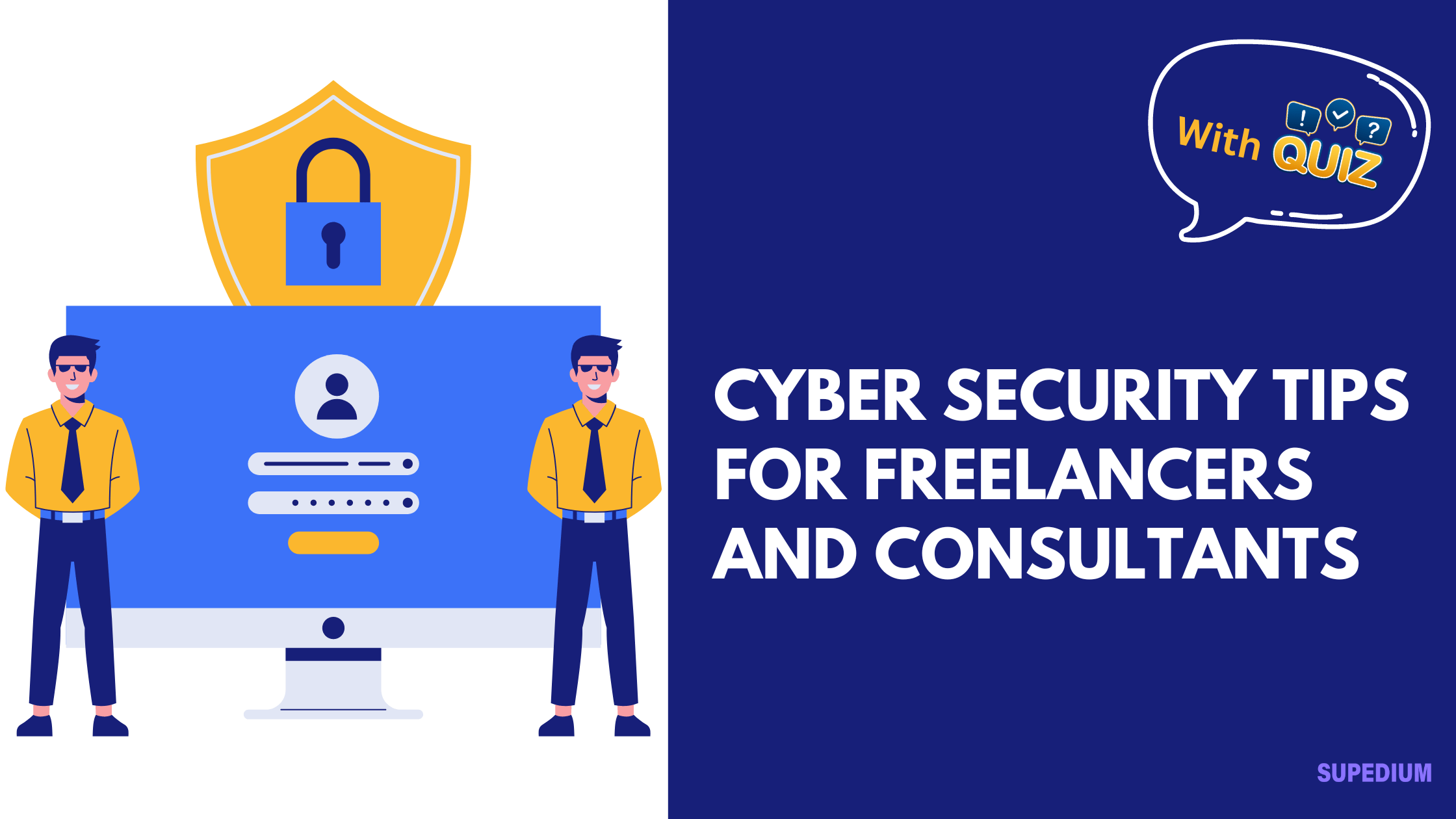Table of Contents
![]()
In today’s digital age, freelancers and consultants are increasingly reliant on technology to manage their work and communicate with clients. However, this reliance also makes them prime targets for cyber threats. Understanding and implementing effective cyber security measures is essential for protecting sensitive information and maintaining client trust. This article explores common cyber threats and provides practical tips to help freelancers and consultants enhance their cyber security.
Understanding Cyber Threats
Types of Cyber Threats
- Phishing Phishing attacks are designed to trick individuals into providing personal information, such as passwords or credit card numbers. Attackers often disguise themselves as legitimate entities through emails or messages. Recognizing phishing attempts involves being cautious of suspicious links, unexpected attachments, and unusual requests for sensitive information.
- Malware Malware refers to malicious software, including viruses, trojans, and spyware, that can infiltrate your system without your knowledge. Signs of a malware infection may include slow device performance, unexpected pop-ups, or unfamiliar programs appearing on your computer.
- Ransomware Ransomware is a type of malware that encrypts files on a victim’s device, rendering them inaccessible until a ransom is paid. Preventative measures include maintaining regular backups and ensuring your software is up to date.
- Data Breaches A data breach occurs when unauthorized individuals gain access to sensitive information. Common causes include weak passwords, unpatched software vulnerabilities, and human error. The impact of a data breach can be devastating, potentially leading to financial loss and reputational damage.
Essential Cyber Security Practices
Strong Password Management
Creating strong, unique passwords is crucial for safeguarding your accounts. Consider using a password manager to generate and store complex passwords securely. Additionally, implementing two-factor authentication (2FA) adds an extra layer of security, requiring a second form of verification beyond just your password.
Secure Your Devices
Keep your devices secure by regularly updating software and operating systems. Installing antivirus and anti-malware software can also help detect and eliminate threats. Setting up firewalls adds another layer of protection against unauthorized access to your network.
Safe Internet Practices
Avoid using public Wi-Fi networks for sensitive work, as these can be easily intercepted by attackers. If you must use public Wi-Fi, employ a Virtual Private Network (VPN) to encrypt your internet connection. Always be cautious when downloading files or clicking on links, particularly from unknown sources.
Data Protection Strategies
Backing Up Your Data
Regularly backing up your data is essential in case of a cyber attack or hardware failure. Consider a combination of cloud and local backups to ensure redundancy and accessibility. This practice helps safeguard your work and client information from potential loss.
Secure File Sharing
When sharing files with clients, use encrypted communication channels and secure file-sharing platforms. This helps protect sensitive information from unauthorized access. Familiarize yourself with best practices for storing and transmitting client data securely.
Handling Client Data Responsibly
As a freelancer or consultant, it’s important to understand data privacy laws relevant to your clients’ information. Familiarize yourself with regulations like GDPR or CCPA and implement best practices for handling, storing, and sharing client data to ensure compliance and build trust.
Communication Security
Secure Communication Tools
Utilizing secure communication tools can enhance your cyber security. Opt for encrypted messaging apps and reliable video conferencing platforms that prioritize privacy. Ensure you are using updated versions to protect against vulnerabilities.
Recognizing and Avoiding Social Engineering
Social engineering tactics exploit human psychology to manipulate individuals into divulging confidential information. Be wary of unsolicited requests for sensitive data and verify the identity of anyone requesting information before responding.
Incident Response Plan
Developing an Incident Response Strategy
Having a well-defined incident response strategy is crucial for minimizing damage in the event of a cyber attack. Outline steps to take if you suspect a breach, including isolating affected devices and notifying clients if necessary. Documenting incidents can help in assessing and improving your cyber security measures.
Recovery and Reporting
If you experience a cyber attack, act quickly to recover your systems and data. This may involve restoring backups, removing malware, and updating passwords. Additionally, report incidents to relevant authorities, such as local law enforcement or cybersecurity agencies, to help combat cyber crime.
Staying Informed
Continuous Learning about Cyber Security
Cyber security is an ever-evolving field, and staying informed about new threats and best practices is essential. Utilize online resources, including blogs, courses, and webinars, to keep your knowledge up to date. Following cybersecurity news can also alert you to emerging threats.
Networking with Other Professionals
Connecting with other professionals in your field can provide valuable insights into effective cyber security practices. Consider joining cybersecurity communities, attending conferences, and participating in workshops to enhance your understanding and build a support network.
Conclusion
In a digital landscape fraught with cyber threats, freelancers and consultants must prioritize their cyber security. By implementing strong security practices, staying informed, and developing a proactive approach to potential threats, you can protect your work and maintain the trust of your clients. Remember, investing time in cyber security is an investment in your future success.






Be the first to comment